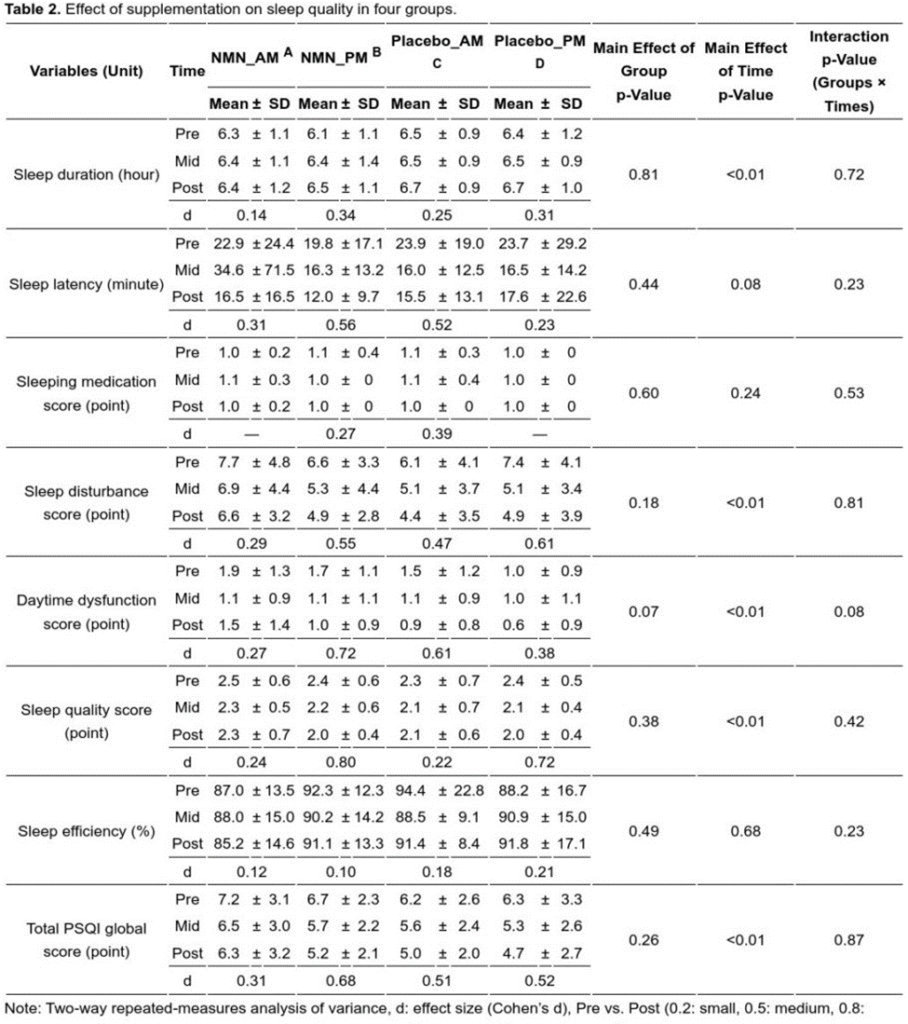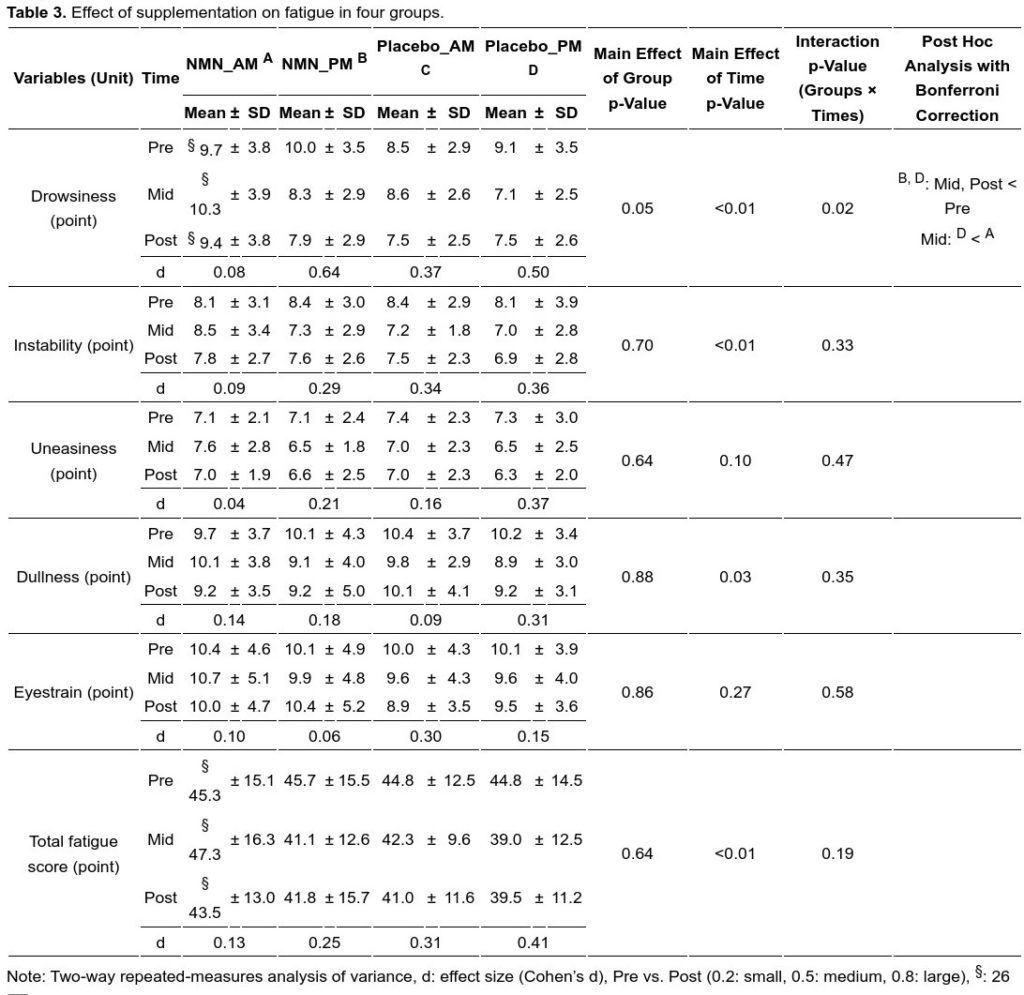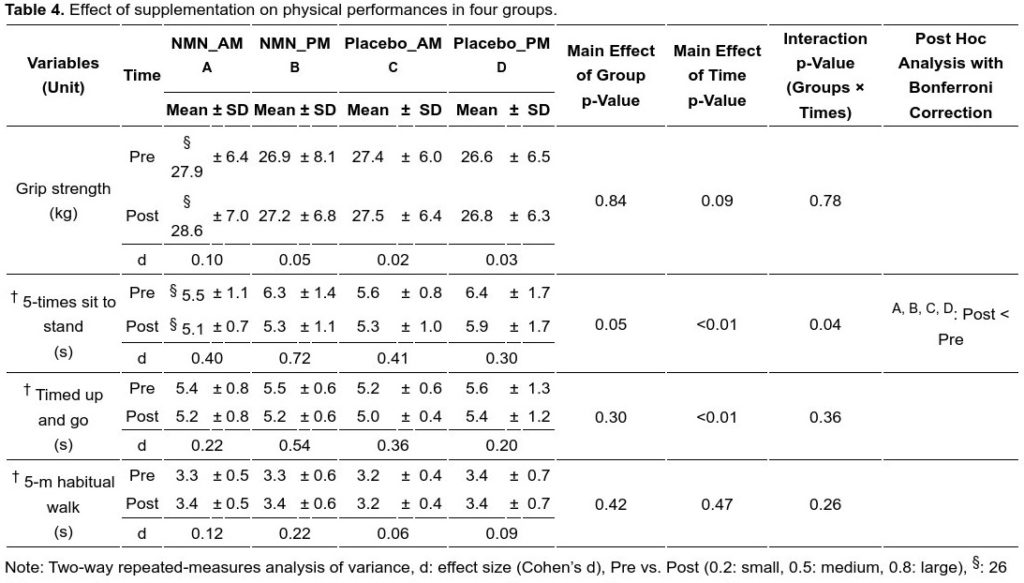Japanese Study Suggests NMN Benefits Sleep and Physical Performance in Older Adults
A clinical study shows that 12 weeks of supplementation with the immediate NAD+ precursor NMN enhances sleep quality and lower limb function to potentially benefit physical and mental health.
Highlights
- NMN supplementation improves sleep quality to reduce drowsiness in adults over 65 years old.
- Better sleep has been shown to improve cognition and physical performance, which may improve aged adults’ outlook on life and the overall number of healthy years people live.
As we age, our sleep quality dissipates, facilitating cognitive decline and ultimately, depressive moods and states of mind. The resulting depression and diminished cognition lead to a snowball effect of falling out of shape while becoming frail. Age-associated frailty further increases the probability of diseases like metabolic disorders and cardiovascular ailments. This physiological scenario begs the question, “How can we intervene to improve sleep, physical performance, prevent frailty, and avoid age-related disease to increase the number of years we live in health?”
Okura and colleagues from Tsukuba University in Japan published in Nutrients showing that taking nicotinamide mononucleotide (NMN) in the afternoon for 12 weeks at 250 mg doses enhances physical function and reduces drowsiness in older adults. This treatment in study participants aged 65 years improves lower limb function, suggesting the prevention of an age-related loss of physical function. Moreover, overall drowsiness was significantly reduced, and sleep quality was improved as measured by sleep duration and sleep disturbance. Results from the study indicate that NMN supplementation may improve sleep and restore physical performance in older adults to extend the number of healthy years that we live.
Taking NMN in the Afternoon Improves Sleep Quality and Physical Function in Aged Adults
Okura and colleagues compared the effects of taking 250 mg capsules of NMN daily in the morning or afternoon over a 12-week time course. Study participants were aged 65 years and older, and those using too much caffeine, having too much stress, and taking sleeping medication or anti-depressants were excluded from the study. After applying these exclusion criteria, four groups with 27 subjects each were included: an NMN morning group, an NMN afternoon group, and an afternoon and morning placebo group.
To find out whether supplementing with NMN improves sleep quality, Okura and colleagues utilized a sleep quality analysis called the Pittsburgh Sleep Quality Index (PSQI). This analytical tool has been proven reliable in measuring subjective sleep quality by examining sleep duration, sleep disturbance, daytime dysfunction, sleep quality, and sleep efficiency. The results showed that afternoon NMN improves sleep duration and quality, as shown by a lower sleep disturbance score.

(Okura et al., 2022 | Nutrients) Measurements of sleep quality increased after NMN was consumed in the afternoon. Sleep duration, sleep quality, and overall sleep score assessments improved with afternoon NMN supplementation.
To then find out whether NMN supplementation during the afternoon improves the overall quality of life, the Japan-based research team measured indices of fatigue. They found that drowsiness significantly decreased along with mental dullness and total fatigue. Reductions in drowsiness and fatigue can enhance concentration and the capability to perform cognitive tasks.

(Okura et al., 2022 | Nutrients) Supplementing with NMN in the afternoon reduces subjective measurements of drowsiness and total fatigue. Subjective measurements of drowsiness, instability (inability to focus) and total fatigue substantially decline with NMN intake during the afternoon.
Improvements in sleep positively affected measurements of physical function of adults aged over 65 years. For example, a measurement of physical fitness in the aged adults showed that durations from sitting to standing positions for five consecutive times improved significantly when NMN was administered in the afternoon. The timed up and go exercise improved substantially, also. These data show that having older adults take NMN improves their overall sleep and physical function, which may positively impact their moods and diminish their potential age-related depression. With depression alleviated by taking NMN in the afternoon, cognition may improve, leading to overall better health during aging (improved healthspan).

(Okura et al., 2022 | Nutrients) Supplementing with NMN in the afternoon enhances physical function in aged adults. NMN in the afternoon reduced the time it takes for 5-times sit to stand in aged adults, along with the physical feat of reducing the timed up and go task.
Taking NMN in the afternoon significantly improves sleep, reduces drowsiness, and improves overall physical fitness in aged individuals over age 65. Such a physiological scenario will improve one’s day-to-day attitude, which will improve one’s quality of life and extend the number of years that they live in overall good health (healthspan).
The data from this study is not the most impressive. There is statistically significant data showing that NMN improves physical function such as the five times sit-to-stand exercise. A big issue with the study is the subjective data showing that NMN improves sleep and drowsiness scores. This makes the connection between NMN improving sleep to improve physical function a stretch. The bottom line is that NMN improves physical function and subjective sleep scores; however, this correlation may not be causally linked. The only way to show whether this correlation actually exists is to provide more tangible sleep-related data showing that NMN enhances, for instance, the duration of dream sleep (REM sleep) to then diminish drowsiness. Otherwise, the data provided in this study is somewhat repetitive to previous studies that have shown that NMN improves physical function in humans.

